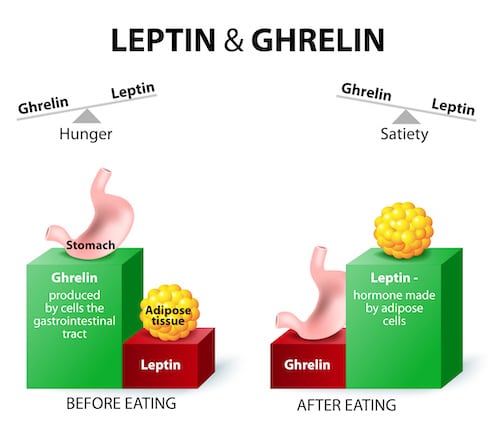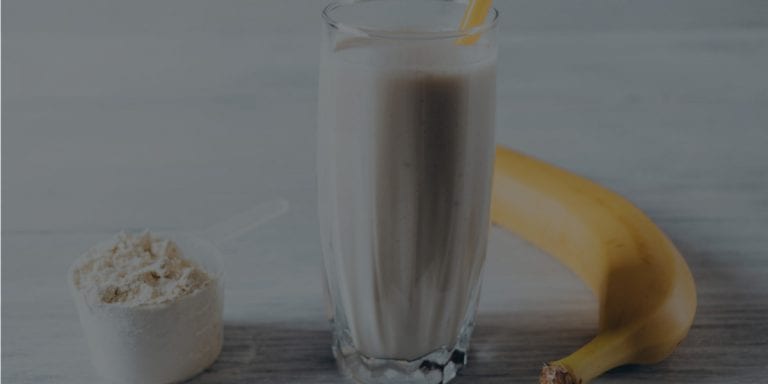Ghrelin & Hunger Regulation
Tackling hunger can be a colossal challenge when you’re trying to optimise your health and fitness. Expert Ben Hardman has produced this guide to ghrelin and hunger regulation, explaining how ghrelin operates, and what you can do.
Stomach rumbling? Feeling hungry?
If you’re anything like me, this happens on a daily basis. And there’s one hormone we have to thank for that – ghrelin.
Yes, this single hormone is the only known ‘orexigenic gut peptide’, or hunger-stimulating hormone to you and me.
Stimulating hunger is an important task. Doing so serves our body’s functioning and energy balance, and ties in with overall weight management. It’s for these reasons ghrelin is a very interesting hormone to know about.
So, let’s get to know ghrelin, what this hormone is all about, the functions it plays, and how your food impacts ghrelin levels.
What is Ghrelin?

Ghrelin is a peptide hormone, affectionately known as the ‘hunger hormone’.
As the nickname hints, ghrelin’s primary role is to tell you when you’re hungry.
This feedback system operates on a short-term scale to regulate food intake, but it also goes hand in hand with long-term bodyweight regulation.
The hormone ghrelin was only discovered in 1999. In scientific terms, it’s still relatively new and there’s lots of ongoing research to find out more on ghrelin’s actions and functioning.
The name ghrelin was actually given due to its positive influence on growth hormone – ‘ghre’ means grow.
What Role Does Ghrelin Play In The Body?
In the simplest terms, ghrelin directly affects hunger levels. The more ghrelin present, the bigger the appetite.
With this in mind, ghrelin’s primary role is to stimulate food intake.
Ghrelin does this through an intricate system of feedback loops. The main driver of ghrelin production is how empty your stomach is. An empty stomach equals increased ghrelin production. But it’s clear there are many other factors at play that influence ghrelin release. We’ll go into more detail further below.
When ghrelin is produced, the body is motivated into finding and eating food. In term, this stimulates a cascade of secondary ghrelin function.
Secondary Roles of Ghrelin
The increased presence of ghrelin kickstarts a whole series of bodily functions, not simply the sole behavioural desire to eat food.
Connected to food intake, ghrelin levels also:
- Stimulate the secretion of gastric acid
- Stimulate the digestive system to move food through the stomach to the intestines
- Stimulate pancreatic protein output
- Help to control blood sugar levels and the release of insulin
- Help regulate fat storage in adipose tissue
- Influence long-term energy metabolism
There are also a number of functions that ghrelin influences away from the digestive system. Studies have shown that ghrelin has a role to play in:
- Growth hormone release
- Protecting from muscle weakness and stimulating myogenesis (new muscle cells)
- Modulating of cardiovascular function
- Stimulation of bone formation
- Stimulation of neurogenesis (new neuron formation)
- Learning and memory
- Neuroprotection against degenerative diseases, such as Parkinson’s
It’s absolutely clear that ghrelin is far more than ‘just’ the hunger hormone.
Ghrelin’s Role In Glucose Regulation
It’s worth a separate section on ghrelin’s role in glucose levels.
In fact, the studies are mounting to suggest that ghrelin’s role in glucose regulation could be more physiologically important than appetite regulation.
The science is still unsure though on exactly what’s at play.
Firstly, several observations have shown that insulin may inhibit ghrelin secretion. This makes sense. Insulin is present when blood sugar is high, which more often than not means your body’s metabolic needs are met. No need for ghrelin then to spark hunger.
When ghrelin levels do rise, it seems like they have a modulating effect on insulin production.
There’s clearly a complicated and influential link between the signalling pathways of ghrelin and insulin.
Where Is Ghrelin Produced?
Ok, so we know that ghrelin plays a part in an impressive number of roles within the body, but where does this hormone come from?
Ghrelin is predominantly produced and released by the stomach. Around 60-70% of all ghrelin comes from the stomach. This solidifies where ghrelin’s primary impact is.
Most of the remaining ghrelin is produced in the small intestine. You also get low levels of ghrelin released by the hypothalamus, pituitary, kidneys and pancreas. When the stomach is operated on, these other areas pick up the slack and produce more ghrelin for the body.
When Is Ghrelin Released?
In basic terms, ghrelin increases in between meals as your stomach becomes more empty. Ghrelin levels decrease after you’ve eaten when your stomach is full.
Stomach size and emptiness are direct correlators of ghrelin production. The messages then get sent up to the hypothalamus in the brain, which decides what happens next.
Here’s the quick rule of thumb:
- Empty stomach = higher ghrelin
- Full stomach = lower ghrelin
But, there’s a lot more to it behind the scenes.
Alongside how empty or full your stomach is, the body is receiving signals from your energy system, on blood sugar levels, leptin levels and fat metabolism. The brain weighs everything up to stimulate the production (or not) of ghrelin.
Hydration could also play a small role. Being thirsty may stimulate higher levels of ghrelin, which is why some say drink some water when you’re feeling hungry.
Like most things in the human body, there are many dimensions to something that seems reasonably simple on the surface. Ghrelin is no different.
Ghrelin vs Leptin – What’s The Difference?
Both ghrelin and leptin play important roles in your metabolism and hunger levels. But they operate on the opposite sides of the table, so to speak.

The increase in ghrelin, mainly produced by the stomach, increases hunger.
Whereas the increase in leptin, mainly produced by fat cells, decreases appetite levels.
Studies have shown that leptin inhibits the secretion of ghrelin in the stomach, which in turn decreases hunger. This makes sense.
That said, scientists believe there’s a much more complex interaction at play to go with this simple feedback loop.
Ghrelin generally acts on a shorter time frame than leptin, which has more influence on long-term fat management. It’s clear though that both hormones have some form of influence over both the long and short term when it comes to bodyweight management.
This whole scenario has been termed the ‘ghrelin-leptin tango’ and you will often see fat burning supplements stating they aim to impact ghrelin and leptin production in the body.
Ghrelin and Dieting
When you’re dieting, your ghrelin levels go up.
This is because your body is in a period of reduced caloric intake, which it generally doesn’t like. By increasing ghrelin, it’s telling you to take on more calories so that it can be sure all bodily needs are met.
This is why it’s difficult to maintain a restrictive diet over an extended period. For the large part it’s unsustainable, as well as pretty uninspiring. I’m always a fan of making things as sustainable and as enjoyable as can be. Dieting doesn’t have to be any different.
So, what’s the best thing to do about ghrelin today?
The best thing you can do to maintain correct ghrelin levels is to lead a healthy lifestyle. As boring as that sounds, it’s true.
A balanced, healthy diet of whole foods, protein and fat, coupled with exercise, good levels of sleep and low stress levels will all help to regulate ghrelin levels to keep them within a normal range.
These are all much easier said than done, I know. But they’re the most direct way for you to influence ghrelin levels so they’re at their optimum.
Can Ghrelin Be Manipulated To Aid Weight Loss?
Given ghrelin’s role in appetite stimulation, the next logical question to ask is: Can reduced ghrelin levels help with weight loss?
In theory, yes – but the complication is that there’s no simple way to manipulate ghrelin levels, and although many appetite suppressants make attempts at this, it is not something that has been widely successful.
Further to this, many studies have reported lower ghrelin levels already in obese individuals compared to lean individuals. This makes sense, as the body is not sending the signal to tell an obese person that they’re hungry. It’s a similar story with leptin. Obese people already have high leptin levels (telling them not to eat), which they’ve become resistant to.
So, for heavily overweight people, dampening down ghrelin levels probably wouldn’t be the answer.
Stomach surgeries, such as gastric bands and sleeve gastrectomy, have been shown to lower ghrelin levels alongside decreasing the physical space of a stomach. This is why they work so well in helping someone to lose weight.
Researchers are now working on different, non-invasive types of medications that can be taken orally to block ghrelin receptors. The theory is that blocking ghrelin receptors will decrease a person’s appetite.
I can’t really delve into the intricacies and potential implications of this. It’s a complex and evolving area. You’d also have to be really careful in exerting an external influence on what is a complicated and refined endocrine system.
There’s a lot more research still to be done, but it seems that controlling ghrelin in some manner could play a role in hunger regulation (when absolutely necessary) and contribute to the battle against obesity, which of course would be beneficial.








